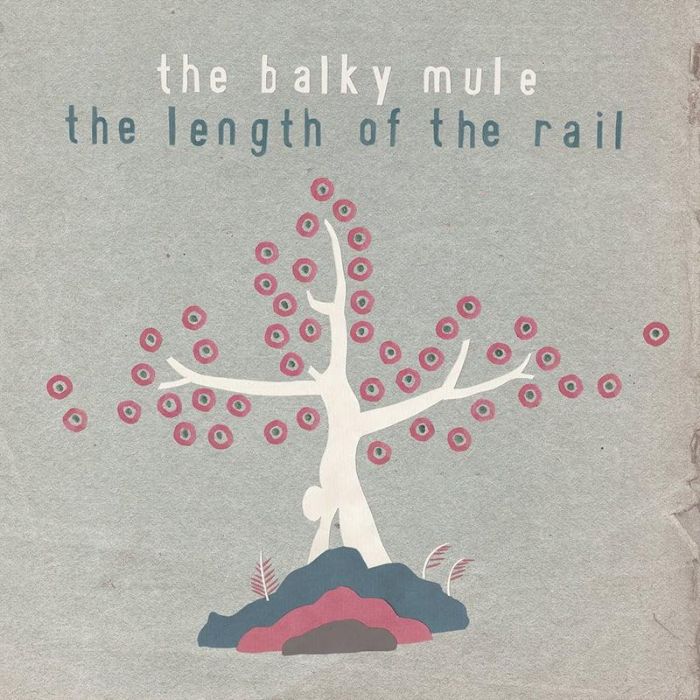The Length of the Rail by The Balky Mule (Review)

Sam Jones, the man behind The Balky Mule, will write songs with whatever he can get his hands on. The initial inspiration for the songs on The Length of the Rail, his second under the name The Balky Mule, came from rescuing odd instruments from boot sales and recording snippets and vignettes, which he would later cobble together into a sort of mishmash singer/songwriter style.
Jones did time in the infamous Bristol shoegazer scene of the early ’90s, contributing to bands such as Flying Saucer Attack, Crescent, and Movietone, and perhaps it was with those psychedelic noisemongers where he learned such interesting and eccentric arrangement techniques. He strings together bleepy analog synths, woozy organs, claptrap ramshackle percussion, and intermittent guitar strums to create a dense and fascinating tapestry.
Take, for instance, opening track “Dust Bath Birds” which features a bouncy latin jazz flavor, but feathered with the fluttering of a flock of birds, and a surprising distorted guitar solo out of nowhere, which reminds me of recent Mt. Eerie records, and sounds like the future of folk music.
It is all these interesting frills, bells, and whistles that makes The Length of the Rail such a beguiling listening experience that rewards repeat listens as you are drawn further and further into the world of Sam Jones. But all the bric-a-brac serves to draw the listener in, to listen closer, to Jones’ lyrics, which read more like shards of short stories, subjective and dreamy, which seem to place you behind the eyes of the songwriter. This is all shade and suggestion, nothing heavy-handed here, hardly even a rhyme scheme. Rather, what you get is a non-stop barrage of text and images, surreal and psychedelic, that makes “Blinking,” the instrumental track five songs in, come as a welcome relief.
The Balky Mule have garnered some comparison to Syd Barrett, the Madcap himself, and I can see the similarities. The disjointed rhythms, making music with whatever material lie at hand; the sing-song barrage of lyrics with a nursery rhyme quality — there is a an experimental British pastoralness here, like Barrett, Julian Cope, Nick Drake, and The Incredible String Band, with mentions of gardens and forests, mountains and seas. O, how the British seem to so dearly love the countryside!
It is a hallucinatory world of miniature trains and raspberry lemonade that is evoked, with a transistor radio playing crackling songs from your childhood as you skim along like a kite. It can make for a rather exhausting listening experience, like reading a really weird short story collection, but it pays off in seeing the world in a new, fresh way. Also, the broken down thrift store machinery provides some interesting loops and textures, and I find the loose structure of these songs occasionally brilliant, and always interesting and different.
Sam Jones was in the process of leaving his home, and moving halfway across the globe to Australia, during the process of making this album. The music was recorded in Bristol, with the lyrics added, after the fact, in Australia. What we are left with is an interesting scrapbook of a transitional period in a talented musician’s life, who has the skills and the wit to capture the flying carpet sensation of everything changing.
The Balky Mule takes risks, he challenges his audience. He doesn’t spoonfeed singalong anthems. But the oddity is tempered with a tuneful ear — “Wireless” is a rather poppy number, with a pretty insidious hook — and the whole thing seems to hang together by its own internal logic.
I am excited and inspired to hear someone doing something unique and adventurousness in the folk/singer-songwriter idiom, which is too often safe, boring, and uninspiring. The amount of care and detail is evident, if you pay attention, and obviously a labor of love. If you are a fan of Broadcast or Stereolab, with their soulful analog somnambulism, or perhaps M. Ward’s soporific strumming, then this might be for you. You might not get it, at first, but it is worth the effort, and you may hear and see things a little differently after the fact.
Written by J Simpson